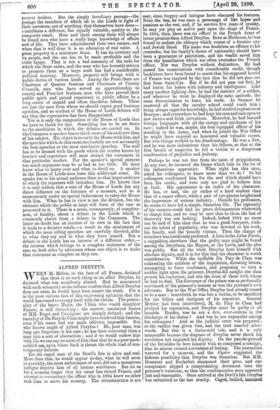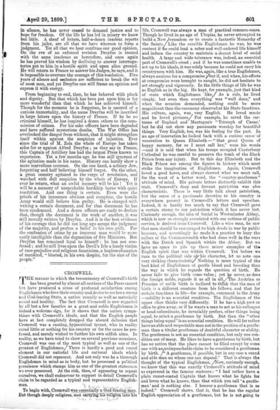ALFRED DREYFUS.
liTHEN M. Maine, in the face of all France, declared that there is no such thing as an affair Dreyfus, he declared what was manifestly absurd. Had he announced with such solemnity as the tribune confers that Alfred Dreyfus does not exist, he would have been nearer the truth. For it is the most curious fact of this engrossing agitation that the world has ceased to occupy itself with the victim. The person- ality of the brave Major, the Uhlan who would slaughter France, is still interesting ; the narrow, casuistical brains of MM. Roget and Cavaignac are sharply defined; and the rascality of Du Paty de Clam might have rendered him famous, even if his name had not made oblivion impossible. But who knows aught of Alfred Dreyfus ? He, poor man, was long ago forgotten in his case; he has been converted from a into nto a sort of abstraction • and if we would endow him with life we can say no more of him than that he is a poor pack- saddled ass, upon whose back is thrust the whole load of con- temporary hatreds. Yet the caged man of the Devil's Isle is alive and real. More than that, he would appear to-day, what he will seem to posterity, the most unfortunate of men, did not a monstrous intrigue deprive him of all human semblance. But let us for a moment forget that his name has ruined France, and attempt to reconstruct the officer who in 1894 knew no other task than to serve his country. The reconstruction is not easy, since forgery and intrigue have obscured his features. None the less, he was once a personage of like hopes and passions as the rest, and, if he survive five years of cruelty, he may yet play an active part upon the stage of France. In 1894, then, there was no officer in the French Army of better promise than Alfred Dreyfus. Born at Mulhouse, he was forced to endure the Obloquy which comes of a frontier city and Jewish blood. His name was doubtless an offence to his comrades, but his family's choice of nationality should have been a guarantee of patriotism and his wealth saved him from the humiliation which toe; often overtakes the French . . . . officer. Nor was Dreyfus without distinction. He had passed his examinations with considerable credit, though backbiters have been found to assert that his supposed hatred of France was inspired by the fact that he did not pass out first from Saint-Cyr. But if he did not pass out first, he had learnt his lesson with industry and intelligence. Like many another fighting Jew, he had the instinct of a soldier, and wherever he went he displayed the same aptitude, the same determination to learn his trade. At Saumur mastered all that the cavalry school could teach him ; being always eager for knowledge, he had studied explosives at Bourges ; and everywhere he had kept his eyes and ears open to new tactics and fresh inventions. Moreover, he had learned foreign languages with all the energy and quickness of his race ; indeed he was, maybe, the best quipped officer of his standing in the Army, and when he joined the War Office he might have enjoyed an honoured and valuable career. But two things worked to his disadvantage. He was a Jew, and he was more industrious than his fellows, so that at the first breath of suspicion he fell a victim to a dangerous combination of prejudice and jealousy.
Perhaps he was not free from the taint of priggishness. At any rate, he incurred the blame which falls to the lot of the industrious apprentice. What right has this man, asked his colleagues, to know more than we do ? So his colleagues condemned him for the zeal which should have been his credit, and were only too glad to believe him at fault. His appearance is an index of his character. He has, or had, the air rather of a hard student than that of a smart officer, while a pair of eye-glasses heightened the impression of serious industry. Outside his profession, he seems to have led a simple, blameless life. The ingenuity of his enemies could find no grave delinquencies wherewith to charge him, and we may be sure that to them the lust of discovery was not lacking. Indeed, beforb 1894 no more can be said of him than that he was a good bourgeois with- out the talent of popularity, who was devoted to his work, his family, and the homely virtues. • Then the charge of treachery was insidiously preferred. A hint in the Libre Parole, a suggestion elsewhere that the guilty man might be found among the Dreyfnses, the Mayers, or the Levis, and the plot was public. But all the while Dreyfus bore himself with absolute dignity, and it is for this that his character is worth consideration. While the ineffable Du Paty de Clam. was exhausting the artifices of the inquisition, dictating letters, attempting to force confession, and proposing to turn a sudden light upon the prisoner, Dreyfus did naught else than protest his innocence, and win the trust of those with whom he had to deal. The Governor of the prison was as profoundly convinced of the prisoner's honour as was the prisoner's own advocate. But to the War Office Dreyfus had already ceased to be a man : henceforth he was but a victim, to be sacrificed for the follies and intrigues of his superiors. General Mercier had been interviewed, M. du Paty de Clam had pledged his reputation, and Dreyfus must be °may at all hazards. Besides, was he not a Jew, over-zealous in the discharge of his duties ? And was he not unpopular among his colleagues ? And so the judicial error was prepared ; so the verdict was given first, and the trial enacted after- wards. But this is a thrice-told tale, and it is only memorable because the disgrace of Dreyfus never shook his resolution nor impaired his dignity. On the parade-ground of the Invalides he bore himself with so composed a courage, that he almost created a revulsion of feeling. The journalists wavered for a moment, and the Figaro suggested the hideous possibility that Dreyfus was blameless. But MM. Drumont and Rochefort . sharpened their pens, and one conspirator slipped a compromising document into, the prisoner's waistcoat, so that the condemnation soon appeared just and reasonable. Once arrived at the Devil's Isle Dreyfus- was submitted to the last cruelty. Caged, bullied, immured in silence he has never ceased to demand justice and to hope for freedom. Of the life he has led in misery we know but little. A sheaf of letters, half-a-dozen insolent reports from his jailer, are all that we have whereon to form a judgment. Yet all that we hear confirms our good opinion. On the eve of an enforced revision Dreyfus is treated with the same insolence as heretofore, and once again he has proved his wisdom by declining to answer interroga- tories put to him in a hostile spirit and upon alien • ground. He will return to France to answer his Judges, he says, and it is impossible to overrate the courage of this resolution. Five years of silence and seclusion are sufficient to break the wit of most men, and yet Dreyfus can still frame an opinion and express it with energy.
From beginning to end, then, he has behaved with pluck and dignity. But that which has been put upon him is far More wonderful than that which he has achieved himself. Though for the moment he is forgotten he is assured of a curious immortality, and the name Dreyfus will be inscribed in large letters upon the history of France. If he be no criminal himself, he has inspired a dozen others to the com- mission of crimes. For his sake officers have been degraded and have suffered mysterious deaths. The War Office has overlooked the danger from without, that it might strengthen itself within against the suspicion of injustice. Ever since the trial of M. Zola the whole of Europe has taken sides for or against Alfred Dreyfus ; as they say in France, this Captain of Artillery has had the largest Press known to experience. Yet a few months ago he was still ignorant of the agitation made in his name. ago can hardly show a more marvellous contrast. On the one hand, a solitary Jew, forgetting and half believing himself forgot. On the other, great country agitated to the verge of revolution, and watched with dull suspicion by the whole of Europe. If ever he return, what an awful memory will be his ! Yet it will be a memory of unspeakable hardship borne with quiet resolution. And one thing is certain. Even were the .prbofs of his innocence obvious and complete, the hostile Army would still believe him guilty. He is charged with writing a certain document, and for that document he has been condemned. And a dozen officers are ready to declare that, though the document is the work of another, it was still morally written by Dreyfus. And it is the best evidence of his courage that he did not long ago accept the judgment of the majority, and profess a belief in his own guilt. For the confession of crime by an innocent man would be more easily intelligible than the dogmatism of five Ministers. But Dreyfus has remained loyal to himself : he has not con- fessed-; and he still lives upon the Devil's Isle a lonely victim of race-prejudice and religious fanaticism, a hapless champion of mankind, "blasted, in his own despite, for the sins of the people."























































 Previous page
Previous page